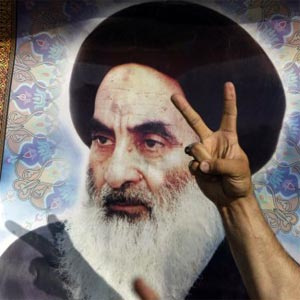Regret Is a Few Steps Away

Tightlipped Iran against Saudis insult to Grand Ayatollah Sistani has raised questions and concerns alike. By Ali Musavi Khalkhali.
It has been for more than two weeks that Saudi mouthpieces are attacking Grand Ayatollah Ali Sistani, much-revered religious leader and paramount figure of the Najaf Seminary. Al-Watan publishes an offensive cartoon and Saudi government stops the activity of the ayatollah’s cultural center in its territory.
Iraqis pour into streets to denounce the state-incited cartoon, their government condemns the affront and clerics of other countries express their sorrow. In India, Pakistan, Afghanistan and the United States the Shiite minority stages protests against the Saudis. Waiting for the Islamic Republic? It has shown no reaction so far. It wasn’t even on Manouchehr Mottaki agenda in his visit to Baghdad.
Bitter it becomes when we find out that Grand Ayatollah Sistani has still retained his Iranian identity card. But for him there are no gatherings in front of the Saudi embassy, no sit-ins and no emotional statements issued by political seniors. Even Iran’s religious cities Qom and Mashhad showed no reaction. What is with the silence? What causes the Iranian government to stay tightlipped against the Saudi misconduct?
There are four possible explanations for Iran’s lethargy. First is that Iran doesn’t want its political row with Saudi Arabia to heat up. At the moment, bilateral ties are as tense as possible and Saudi Arabia does not even bother to conceal their anti-Iran campaign. But would Saudis remain silent if even a low-profile Iranian cleric criticized their religious figures?
Iran fears that any harsh reaction could fuel the already fierce regional competition and help Saudi Arabia to form a united Arab front against it. It doesn’t look like a good excuse for staying closemouthed and appearing as the weaker party. The Iranian religious community is at least expected to show a reaction. The Islamic Republic of Iran, as the only Shiite state in the world, should prove that it defends Shiites at hard times.
Deteriorating stamina of our diplomatic body may have stopped it from opening new fronts. Foreign Ministry diplomats probably think that with external pressures at their height and Middle East in a chaotic state; and with the nuclear program, Palestine-Israel issue, the Arab World’s accusations of Iran’s interference and post-election turbulent domestic situation, Tehran is not at a place to add another item to its foci. It may be true, but silence would be regarded as an act of withdrawal, although it would not be the first time our foreign ministry stays inert. Harassment of Iranian pilgrims to Mecca and Medina by Saudi officers is now an old story.
The upcoming parliamentary elections in Iraq may be another reason. Disturbed by Iran’s influence in Iraq, Saudi Arabia may be trying to wage a psychological warfare and pressurize Iran by provoking the sentiments of Iraqi Shiites and challenging their politicians. For the Saudis, Iran is the reason Iraq has become estranged from the Arab World, and they have the mission to return it back in the bosom of the Arab community.
What would be the benefits of Iran’s silence at this moment? Shiites have poured into the streets in Pakistan, Afghanistan, India and the United States. Shouldn’t Iran move a finger? Aren’t we supposed to defend the interests of Iraqi Shiites? When Saudis started aiding the Yemenite government to crack down Houthi uprising, Iranians were in rush to gather in front of embassies of both countries at a time when the public opinion was not familiar with the Houthis and thought of them to be of the Zeidi branch of Shiism, while they are in fact Twelvers, just like Iranians. Is Grand Ayatollah Sistani less respectable? Aren’t we familiar with his international stature?
Decades-old rivalry between Qom and Najaf seminaries may be another cause. That is unfortunately implied by Iran’s behavior. It would not be strange if one thought that Iran has remained silent since the insult would weaken the position of Najaf Seminary and give the upper hand to Qom. But if the chain insults continue, the next target of Wahhabis would ayatollahs of Qom and Mashhad. Our battle would become much more difficult then.

